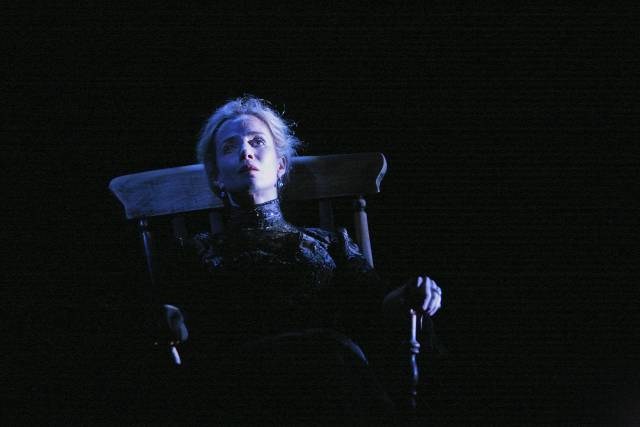

On the centennial of his birth, Samuel Beckett's Not I, a notoriously difficult work for any actor, will be presented alongside two other Beckett shorts, Footfalls and Rockaby at NYU's Skirball Center for the Performing Arts from April 13-17. A rare treat indeed for fans of the Absurdist writer, this trilogy, presented as a single program, is directed by Beckett's close friend and long-time collaborator Walter Asmus and stars Irish actress Lisa Dwan, who has received international acclaim of the highest order for her touring performances in this trilogy, particularly for Not I, for which she was coached by Beckett muse Billie Whitelaw, who was herself coached by Beckett for the same role. Ms. Dwan sat down with StageBuddy on a recent sunny afternoon to discuss, among other things, Whitelaw, Beckett, and her own unique experience with these plays.
How has your performance or interpretation of these pieces changed since you started doing them?
I think it’s changed over time, it continues to change; every performance is different. I’m always finding new things in this work. That’s what’s so fascinating about Beckett, there’s always new discoveries. And it changes with the audience. That’s not to say I play for the audience, but the audience’s collective energy does change with the environment and the pieces themselves. I don’t think I’ll ever forget the reaction when I first opened in New York. I’d only played a very short time in New York, which was why I was so determined to return. But, after Not I, to hear 900 people on their feet and have that kind of reaction… it was almost like a release… it was almost like Not I at that moment spoke the internal chorus of the audience and they just stood up in recognition of that. We’ve really caught up with Beckett and Beckett seems to be writing the truth of our times.
Yeah, he was ahead of his time. Does the audience reaction differ from country to country?
It really does. New York’s response to Not I was extraordinary and it was amazing; and it is always so amazing to hear the kind of silence of a big auditorium during the other two pieces and to hear the kind of nervous coughing and affirmation that Not I provokes. It’s very rare you get to sit in an entirely blackened out auditorium where you can’t even see your own hand in front of your face or have that kind of silence or stillness where you’re not being sold a kind of story or narrative; you’re being provided space to bring your own imagination and your own visceral response to the work and I think that’s what’s so unique about Beckett. I’ve performed this work all over the world and you can’t have simultaneous translation when you’re doing Not I. It’s just too fast, no one can read that fast. And yet I’ve seen time and time again the reactions to it, and seen audiences crying after Not I in Hong Kong or Paris, where they couldn’t have caught every word. But what they were catching was what Beckett wanted when he wanted it at the speed of thought to bypass the audience’s intellect and to play on the nerves of the audience; and if I, as a performer, connect wholeheartedly, try to do that with every phrase, that provokes a sand kind of vibration and the audience will connect to that, and that is fascinating to observe, particularly in foreign languages and I’m amazed.
I started out on this journey being told Beckett doesn’t sell and I just kept pushing and pushing the door and just kept saying “Look do you think now… if we just tried it… and maybe it might… and I think it could… do you think we could get a West End translation…” And then it was, “For god’s sake this is highly intellectual work, things need to be really emotional,” and I was like, “Well, I think it is really emotional.” It’s visceral work and he parodied an over-intellectualization of his work. I performed this for my niece last week. She watched me rehearse, and she’s a hyperactive, vibrant four-year-old and she didn’t move a muscle for the entire thing. Afterwards her mom said to her, “What do you think that was about?” and she said, without thinking about it, “Everything in the world.” When I was rehearsing this back in 2005, I used, as a memory technique, a blindfold, and I would go into a park, Battersea Park, just to connect with the grass and the text and have these kind of visceral connections to certain aspects of the piece. So, myself and the director went in to the park and I put on the blindfold and I performed the piece and when I finished I lifted the blindfold and saw that I had collected an audience of park-bench drunks who stood there transfixed with their cans of cider, with the very substance they were using to quiet that voice. And that connection just persuaded me that this work is for all of us.

How much of this is what the text is actually saying and how much of it do you think is the tempo of the text; what do you think is engaging people the most?
Personally, it’s a very taut discipline on my side. If I recreated a museum piece and did it exactly the way that Billie Whitelaw did, the same rhythms, the same delivery, that would have bored the pants off an audience -- and me, quite frankly. It’s an interesting discipline to really adhere to Beckett’s tempo and structure and words and wrap my own personal narrative around it, my own wounds, and so every step is picking an old scab of mine that I commit to and let bleed in that moment and what I can’t do is let my actor’s vanity start taking over, where I fall in love and start to curate certain aspects of his words that I want the audience to hear. I have to get out of that and really adhere to the discipline and how he wanted it. This has a certain amount of time and that has a certain amount of time.
It’s not up to me to sell certain aspects of Beckett. Beckett wrote a universal truth and found his way to a universal truth by going into his very primary personal domestic story; his own truisms. He wasn’t writing about WWII or the collective trauma of the Holocaust; he was writing about his own sense of alienation and rejection. He went into his own domestic story to find these universal truths. If I’m going to do that, I can’t recreate Billie Whitelaw’s performance. I can’t do it in a kind of “Beckett style.” That is an awful disease that has crept into the performances of Beckett these days. People have this notion that it’s supposed to be this kind of monotone, that they cling onto these notes, that Beckett didn’t want any color, and it’s these kind of handed-down notes that become these kind of Chinese whispers, and they lose the whole sense of what he was after. This is only my approach, but I think that if I personally can bleed up there and connect with my own personal story, I’m giving the audience space to find their own. I’m not selling anything. Beckett doesn’t sell. There’s no agenda, no polemic, no instruction manual. There’s no expectations of us and, in that space where he doesn’t patronize us, he gives us space to find our own wounds, and we all have this kind of collective share that’s very honest. I think that’s what makes this work so visceral and so personal. That’s why I haven’t forgotten the drunks. That moment is just as important for the audience as it is for me up there.
So, then, what do you feel that you did gain from your association with Billie Whitelaw?
Billie was a real meat and two veg kind of woman. She didn’t dress anything up and she, like Beckett, was integrity personified. She broke down a lot of the bullshit around Beckett and really helped me understand what I needed to do. She provided the keys to opening myself up to this work, to not be preoccupied with style. I was worried I was going too fast when I first met her. I was worried that I was adding a bit too much color because, when I first read Not I, I heard the nuns, I heard my father, the streets of Athlone… I had that kind of beaten out of me before, because I had this sense that Beckett didn’t want any color; he didn’t want actors acting. Billie saw I was trying to put this kind of monotone on and she said, “What are you doing?” and I said, “Well, Beckett didn’t want actors acting.” She said, “That’s bullshit.” He wanted all of it. He didn’t want some actor carrying their voice on a trophy into this work; he didn’t want me phoning it in. He wanted the truth and I realized, and Beckett has taught me, that truth has a kind of timbre, a kind of vibration, and it’s not about the content necessarily, it’s where it comes from and the depth of that vibration.
So, with that in mind, I went home, and I cast every phrase. I went, “That’s dad, that’s my cousin, that’s Fred”... It doesn’t matter, because it’s personal. And so the next person who comes around and does Not I should do something similar. I can’t interfere with that. Billie just gave me the keys. And, on the other hand, no one else knows what it’s like up there. She passed away and I really miss her. When I was in Germany right before she died, I’d just call her. Sometimes the work does cost you a lot and I would just weep and she would understand. I miss that. Because this is a lonely road, very few people do it, it does cost you, it changes you profoundly. It’s a gift and a privilege and it’s exciting and wonderful in a lot of ways but it comes at a cost sometimes, and Billie and I would just reach across the void and I know that I was that person for Billie. That’s why she singled me out and rang me and wanted to connect with me when she had stopped connecting with her whole world. She’d become a total recluse but there was something… Not I in particular did something to Billie and changed her forever and to have someone who was able to connect with her in that country, in that place, I think that affected us both greatly.

So, you have this sort of direct connection and there’s this cost… have you felt that you have some kind of obligation to perform these works where others have sort of failed, especially with Not I?
Hm, do I feel obliged? Maybe obliged to myself. It’s a gift. I’m spoiled rotten. The wonderful and the gorgeous thing about the roles and the creatures in Beckett is that they’re not characters; they’re creatures, they’re slices of the universe. I didn’t realize how repressed and underused I had been in my life and in my world and in my creative sphere… when you look at the pithy uncreative roles that are written, people should be fined when they come out with characters so anorexic. Particularly if you’re blonde and young, you get the bitch, the bimbo or the psycho, that’s it, three gears, no more nuance, take it or leave it. And if you are an expansive person, you’re a troublemaker, and we find all these terms to expel people from our midst who frighten us. We’re all so frightened, we take these pithy little bite-sized chunks out of life and ourselves. We put ourselves into Botox-anorexic harnesses. We make ourselves less all the time. We take such limited little bites. We say, “Oh, that’s not me,” or “We can’t set such a precedent.” I was talking to a guy on the phone the other day and every time we spoke (he must have called me about twenty times), he had to ask me the same standard question. That must just chip away at his psyche. That he has to squeeze himself into this formula in every conversation… it must kill him. How he hasn’t taken a gun out and shot himself is beyond me. But Beckett spoils me rotten. He blows all of that out into the open. I’m a creature, I’m consciousness, I’m fucking consciousness, and he wants that and all of it and that is just amazing and it’s so spoiling. I go from womb to tomb in an hour and I’m all over the world and I’m every voice. The voices come from Mordor, they come from beyond our living space. I’m a ghost, I’m an element; I’m an element in the ether. Why would you want to go back from that? It’s so awful, we’re simply just reflector boards for the man’s funny line or his drama of the condition of being male in the modern world. We’re just placed there to say a line so he’ll come back with something profound. There’s so many instances like that and it’s so hard, it’s so depressing… I’m not saying Beckett was a feminist, but, when he was done with his kind of adolescent, boyish, jocular misogyny, he then used the female kind of role to be this vehicle for his own truth and he wrote his very personal primary truths and he hid them in his women and as a result you get this landscape that’s just so vast and that’s a gift and it’s expanded me, intellectually and emotionally and psychologically and philosophically. It’s endless. Every time you dig with Beckett, you find stuff. He was so ahead of us.
It’s a sort of breakdown of different structures, ay? He’s finding a universal truth that we can all relate to by finding that space within the dichotomy. He strips things down to the bare essentials so that you can make it what you will…
Yeah, you don’t get distracted by story. There’s no kind of narrative, there’s no expectations. He is talking about a very universal kind of truth and there’s lots of different techniques he uses to do that. He measured it with maths, he measured it with musical score. If you look at the early draft of Footfalls, it’s written as a stave; it’s musical... He used music, he used maths, he used philosophy; all of the depth is there. So the academics can have a field day. But then he pares it, he takes a homeopathic approach and then distills and distills and distills until you’re left with a very potent essence and, actually, as he progressed in his career, he moved away from all the big Joycean, Modernist ideas, you know, the towering genius from the Greeks to the mythological to the philosophical. He left all of that behind and he went back to his wounds when his mother rejected him or didn’t see him or the pain of repetition. He went to those very domestic, real things and then he took away the traces, because he didn’t want us to get caught up with his biography; he didn’t want to rob us of our own opportunity. This is what is so wonderful about Beckett. He doesn’t patronize, he’s giving us space to come in, and in this kind of poem we’re all invited to come in and just put our hands on our wounds together. It’s unbelievable.
 Do you feel that your early training in ballet gave you a certain advantage towards the musicality of his language?
Do you feel that your early training in ballet gave you a certain advantage towards the musicality of his language?
And the approach. Yeah, I think it gave me a colossal advantage. One of the gorgeous things about ballet in particular is in that taut, difficult discipline there is colossal freedom, but you’ve got to get the core right. So, with respect to technique and structure and then to be a rebel on top of that… I take that kind of radical discipline into my approach. Also, it didn’t even make me think about the amount of work that I had to put into these pieces because when you think musicians rehearse hours a day, dancers dance eight to ten hours a day, why shouldn’t an actor rehearse their work and have the same kind of approach to their craft? We fetishize an actor putting on a few pounds. We think they’re some sort of Stanislavsky slave because they’ve put on a couple of pounds for a role. I just think we need to stop doing that. This is art and art is difficult and demands a kind of discipline. So there’s that, but also he really liberates you into, as I said, that kind of elemental space. Ballet for me growing up was all about that, the body… it’s a fierce, violent discipline; you as a dancer are an element. And I suppose my consciousness was open to that and I adore that kind of space and I take the same approach to his poetry and I dance his poetry and I occupy these spaces that are beyond character and more into the sphere of creature and that’s elemental. The silences are so important in Beckett.
It’s such a demanding role and you’ve devoted so much time to these, how do you intend to move on from them when you’re done?
I’ll cross that bridge when it comes. I’ve got more Beckett work, a one-woman Beckett piece in London coming up. But I think my chiropractor and family will be delighted I’m not putting my body and mind through these and I think it’ll be good for me to put my mind at rest for a little bit. I think comedy will be a good turn, and I think working with others will be welcome. I do think he’s made me a better actor. I think he’s made me a better person. He’s changed my life in the most extraordinary way. I’m here in a new country. I’m in New York. Three years ago I was preparing for this, I was learning tai chi in Adelaide backstage before I went into the world with Not I and now I’m here on an Alien of Extraordinary Ability, an Artist in Residence at NYU and Princeton, I’ve performed all over the world, I’m writing a book on Beckett… my life has changed immeasurably. It has been the most extraordinary gift. But I have to keep challenging myself and I can’t just keep staying in this area, where I’m just doing a vain lap of honor if I keep doing it. I have to challenge myself further. It’s been delicious and heartening and gorgeous to see it sell out all over the world, and to see young audiences, to hear my niece’s reaction… it’s just extraordinary and I get excited, I get excited for her; she has such an expansive mind, she’s born with it; hopefully she’ll be able to resist the miniskirt prisons.
On the centennial of his birth, if there’s one thing we should take away from Beckett’s legacy, what, in your opinion, would that be?
Defiance. Beckett puts his finger on the wound and the trauma and the difficulty, but also he really celebrates our ability to go on when we can’t go on and there’s something so extraordinary about our ability as humans to do that and he celebrates that and I find that exciting and wonderful. And to do that humbly and in truth is beautiful.
Lisa Dwan performs at NYU’s Skirball Center for the Performing Arts from April 13-17.